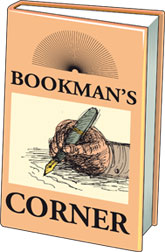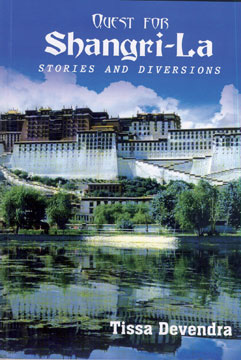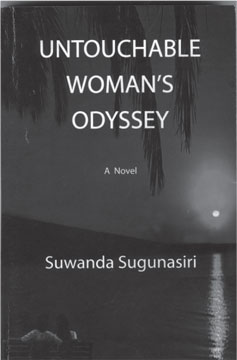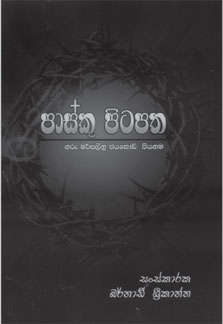|

A writer's reminiscences of lifetime vagaries
Reviewed by M. B. Mathmaluwe
Readers familiar with Tissa Devendra's (25) writings, would agree
that they belong to that pleasant, relaxing genre of reading that could
be covered by the collective term, 'Reminiscences'. In his rambling
tales recording Time's vagaries, he would take his readers along the
now-deserted and cobwebbed corridors of times past, regaling them, as he
is wont to do and as few others can, with his endless tales! Sangrila he
once more digs into a goldmine of these 'Stories and Diversions' to
entertain his readers.
 |
|
Quest for Sangrila
Author: Tissa Devendra
A Vijitha Yapa Publication |
In his new book he begins by referring to his distinguished father,
D. T. Devendra, the reputed archaeologist who commenced his working life
as an assistant teacher at Ananda with those illustrious personages like
Malalasekera, Kularatne, Metthananda et al under the inspired leadership
of Anagarika Dharmapala in the early decades of the last century. Almost
all the stories of the present collection cover the post-Ananda period,
when his father was transferred to Dharmaraja, Kandy, and later, to
Seevali, Ratnapura. TD records the changes introduced in the sartorial
fashions by these famed academics as a part of their contribution to the
revival of Sinhala Buddhist culture. TD's father, 'DT' was one of those
who led the van in this revolution by adopting the national dress.
Having left the more restricted Colombo suburbs, TD comes to Kandy
with his family, when his father was transferred to Dharmaraja where
they go into residence, sharing the Principal's Bungalow, overlooking
the Kandy Lake apparently.
The bungalow's presence has been perpetuated in literature by a
distinguished, former resident of it, D. H. Lawrence who had visited
Kandy and had briefly stayed there. TD refers to a poem Lawrence wrote
while being there titled, 'Elephant.'
At Ananda, as a part of the Buddhist Revival movement and as a
subsidiary manifestation of it, TD's father seemed to be rather obsessed
by a consuming desire to read every available book on Tibet for the
simple reason that it was a stronghold of Mahayana Buddhism. TD
concludes this essay by saying that "as a collateral beneficiary," he
himself read every book on the subject, that his father had read.
TD was soon compelled to bid good-bye to the idyllic scenes and shift
to a house in Kandy Town. Sentimental perhaps, it had not been without a
pang of regret, that he had taken this shift. A great part of the
information presented in TD's book may be new to today's younger
readers, but to the 'oldsters' born in the '20s and schooled in the '30s
and employed in the '40s of the last century, it may not be new for,
most of them carry, if not identical experiences or reminiscences, or
similar to those TD presents.
TD has things, which today's readers may consider as strange, to say
as experiences in Kandy of the 1930s: he mentions a casual acquaintance
he had made with a rag-tag descendant, a certain forest officer living
in Udawattakele, George Davis, of Major Davy, an officer who came with
the invading British armies to Kandy in 1803 and was captured and had
been held prisoner and never released. He had married a Sinhalese woman
and had settled down and had progeny, whose descendant, this George
Davis was. The story ends with a rather unexpected twist. When TD was
spending a brief Sojourn in England, as student of Cambridge University,
he has met George Davis in a park there. Davis had at the behest of a
collateral descendant of the historic Major Davy, been taken to England
to spend his last days!
The incident like the one referring to the lacquered walking stick
and a couple of other similar incidents have been recorded in his
earlier work, Horse Shoe Street.
The reminiscences that TD harks back to, half-forgotten events of
more than seventy-five years ago, of men and events that caused a stir
at the time not only, in that society but also, whose echoes had been
heard in the debating chambers of the Legislature as well, are now part
of our history.
In the chapter, "Tram cars in old Colombo" he stirs memories of the
readers: Which of them can forget the Tram-car era? How these iron
monsters used to go clanging along the rails, screeching and grinding
and raising clouds of dust.
TD has the gift of telling a captivating tale to hold his readers
spell-bound. He spins a story round a person called Fred Brook, a
guest-visitor to his home from the US.
The story titled, "Well behaved women rarely made history" retells
the events surrounding the lives of some notable women, who pass through
the pages of the great chronicle, Mahavamsa.
TD presents a long list of them, everyone of them quite colourful in
her own way: Kuveni, Unmada Chitra, Kelanitissa's Queen, Vihara Maha
Devi, Soma, Anula and several others.
TD taking his cue from the Mahavamsa story, that Prince Dutugemunu
making his long march on Anuradhapura was held up by a General of King
Elara, obstinately refusing to surrender a fortress standing in his way
Having failed to take the fort by any military strategy, as a last
resort,he decided to offer his mother, Viharamaha Devi, as a tempting
decoy to the General.
Now, it is worthwhile considering how plausible or possible such a
move could be. The question arises as to how young and beautiful this
princess could have been at the time she was asked to flaunt her
'charms' before a hard boiled soldier.
Tissa Devendra's book is beautifully produced for which the
publishers, Vijitha Yapa Publications have to be congratulated. It is
profusely illustrated, printed in quality paper with a glossy
illustrated cover.
Slice of life: complex or complicated?
Reviewed by Padma Edirisinghe
Swimming with the tide is always easier than swimming against it.
Emboldened enough to wave a webside many self-discoveries were made, one
of which that over the years. I have reviewed about 200 books to the
press including one uninvited review ie. Remembered yesterdays by Maha
Mudaliyar Solomon Dias Bandaranaike. I have to explain this "Brag"
because I found the review of Prof. Sugunasiri's latest lierary work the
most challenging of the lot. And it was the only work that expended
calls from across the oceans, one at 5 a.m. I was too sleepy to declare
that at this end of the world, I am too much bogged or mired in his
creation to put it all in neat oder for publication.
Maybe some would say that the terms, bogged and mired, desecrate the
book. Is it so sacred? On the other hand some would ooze out that the
book is a singular instance of a writer with an astoundingly rich
vocabulary and a mass of knowledge just packs in an incredible coterie
of "things" under one single title. Perhaps it is the vast dimension of
content matter in the novel that has made certain critics or well
wishers get away very tactfully with their reviews (as presented on back
blurb).
 |
|
Untouchable woman's
odyssey
Author: Prof. Suwanda Sugunasiri |
"Story evolves around two protagonists, male and female ...a story
within a story as in Panchatantra or a story present and a story past as
in Buddhist birth stories"..... "a deeply moving love story of a couple
divided by caste and ethnicity and a brilliant evocation of the ancient,
mythic and religious past of a country in South Asia over two and a half
millennia. "......"wow! What a tale or tale of many tales woven
together. I found it to be incredibly cinematic.
"These are few of the many ravings. I too found the juxtapositions of
many incidents and episodes and tales and call it what you fancy, just
incredible. Leave alone do a review, it left me just gasping...With all
its many guises one thing stands out. Coming down to the bottom line, it
is in one way a panegyric to the writer's native country.
Though living and working in Canada for the last 30 years or so,
after first emigrating to the USA on a Fullbright Scholarship he like
the hundreds of phantom characters he creates is living in his own
country of birth day and night. Figure that our as you would figure out
the rest of the brilliant presentation, "panning from one image to
another, then zooming in like in the films of Luis Bunnel, the Spanish
surrealist film maker.... every story within the story immaculately
frame, and the very frames melting in to the narrative".
What is genius? It can be defined in variegated ways but the utmost
genius in the field of writing could surface when an author manages to
packet into 366 pages a 2500 saga of his country's history via a story,
melodramatic yet extremely touching.
To pander to a simple reader the story is the typical love story of
Podi Mahattaya in the village with the daughter of the latrine coolie,
perhaps reminiscent of the Saliya Asokamala tale. But what a lot you
have to wade through to get to the end? Not only in the tentacles of
Lankan history but in those of Indian history you get trapped in.
The world is full of queer characters. But have I ever found one more
queer than one living 1000s of miles away and framing a story entwining
a myriad historical episodes enacted in the piece of the world he was
born and bred in! Before going on to the list I may pause to mention
that from the few biographical data that I gathered from the book, he
has emerged into the world literati and professional scenario from our
picturesque coastal town of Tangalla, as the son of Missinona
Warnakulasuriya of Dodanduwa and Kalaguru Sawris Silva of Tangalla. The
book itself has been composed in Canada. His critical studies in
literature include "Sri Lankan poets: the bourgeoisie that fled the
Revolution".
He is also a Buddhist scholar and has been a guest lecturer on
Buddhism at the University of Havana and Founding Editor of the Canadian
Buddhism over the last 30 years. These facts are given to present the
many facets of Suwanda Sugunasiri's versatile character.
Now to a few of the events embroiled in the love story between the
Podimahattaya and Tangamma (not given in chronological order but in the
order referred to) ...... famous Milinda Nagasena debates staged in
Bhratha Desha ...... Doing of the National Liberation Front in the 1970s
on home ground...... Flurry of events in Wanghadesha when the lion runs
amok and the aftermath leading to colonisation of Lanka...... The
Independence celebrations of 1948...... Uprising against Uncle Nephew
Party...... birth pangs of Marxism in the island...... Ambedkar Movement
for the salvation of the untouchable...... Capitulation of Lanka to
three colonial powers...... Ehelapola's adventures..... Chola
invasion...... Lanka's missionary activities in far Asia......
Dutugamunu's grand political career...... and so on and so on. And even
a grand dose of sex bubbling with incredible characters.
I will end this review with two bouquets thrown in by Prof. Frank
Birbalsingh, Prof. Emeritus of English, York University and Prof. Vijay
Mishra (Australia) Canadian Literature.
"The story comes alive within a wholly convincing fictional landscape
that serves as the stage for a witty and informative dramatisation of
the country's modern post-colonial struggle for freedom and
independence".
"The dominant themes of Sugunasiri's verse: A strong political
commitment alongside detached pietic Buddhism".
Stanzas from the Dhammapada intersperse the tale, this stanza
relevant to the topic mentioned twice.
Not by birth is one a Vasala
Not by birth is one a Brahmin
Action alone makes one a Vasala
Action alone makes one a Brahmin
(Buddha in Vasala Sutta)
Untouchable woman's odyssey! Pulsating vibrantly underneath it I
could visualise the odyssey of the boy from Tangalla lost among the
creative world carved by his father merry with the jingling bells of the
low country dancer and the rhythmic beats of age old drums, the
heartbeat of the Sinhala race bravely flying out to conquer the world
and almost doing so!
Treat for Passion Play lovers
Reviewed by W.T.A. Leslie Fernando
The Passion Play at Duwa is the proud boast of every Negombian. They
make it a point to attend the Duwa Passion Play unless they are held up
for some reason or the other. It is indded a significant event in
Negombo. Both the Duwa Passion Play and the outstanding statue of the
crucified Christ have fascinating histories.
In the 19th century some fisherfolk in Duwa sailed in their
Catamarans to South India to bring dried fish, nets and other fishing
gear. Among those who went to South India, there were three brothers,
Juvam, Domingo and Peduru who were the sons of Mihindukulasuriya Adirian
Fernando. They came to know the great sculptor in Cochin Jokeenu Mestri.
In consultation with the elders in Duwa they entrusted Jokeenu Mestri to
sculpt a statue of crucified Christ for the Duwa Passion Play.
 |
|
Pasku Pitapatha
Edited by Bernard Srikanta
An author publication |
In the Lent of 1938 a team from Duwa went to Cochin to bring the
statue they were eagerly awaiting. As the paint of the statue was not
fully dried up Jokeenu Mestri advised them not to remove the statue
immediately. As the South West monsson was about to set in where sailing
back would be difficult and there were only a few days more for the
Passion Play they brought the statue to Duwa against the advice of
Jokeenu Mestri.
The people of Duwa welcomed the statue with all the pomp and
ceremony. However, when they opened up the casket they found the paint
was smudged and the statue was mildewed. They were disappointed that
they could not perform the Duwa Passion Play in that year with all the
solemnity.
The elders of Duwa wanted to get Jokeenu Mestri to repair the statue.
As he was too old Jokeenu Mestri refused to come and instead sent his
senior pupil for the purpose.
The pupil re-painted the statue with a mixture of gold. As a result
the statue in Duwas Christ appeared in a special gold tint not found in
other statues of Christ. The significant statue of Christ in Duwa
attracted more and more people to the Duwa Passion Play.
In 1939 when Fr. Marcelline Jayakody became the parish priest of
Duwa, the Duwa Passion Play was performed with the ages old statues
based on the 'Dukprapthi Prasangaya' written by Fr. Jacome Gonsalvez.
Fr. Jayakody revised and recasted the Duwa Passion Play based on
Dorothey Saeyer's famous drama 'Born to be a King'.
Fr. Jayakody was also Bold enough to introduce human actors for all
the scenes except for Christ, Mary and St. John. He also composed all
the hymns for the play in addition to the traditional Pasan chants.
Since then the fame of the colourful Duwa Passion Play spread far and
wide.
The Duwa Passion Play enacted with over 250 actors all drawn from the
village hamlet of Duwa became, at that time the greatest Passion Show in
Asia. It was considered second only to the famous Passion Show in
Oberammergau in Germany performed once in 10 years.
Bernard Srikantha who has presented several books relating to Negombo
like Meepura Kalakaruvo, Pasku Lipi Saraniya, Parampariua Dheevars
Krama, Meepura Kirthidharaya, Pasku Jana Saraniya and Meepura
Deshapalangnayo this time has managed to get the original, script of Fr.
Jayakody's Duwa Passion Play, Bernard Srikantha had been an actor of the
play enacted by Fr. Jayakody and an assistant Director of the play. He
has edited the script of Fr. Jayakody.
Although the script of Fr. Jayakody has been innovated several times
Fr. Jayakody has been in touch with the improvements. He also has
assisted the innovations by composing new hymns. The ever popular hymn
Sevanali Matha - Sevanali Matha is such a new hymn.
The book is dedicated to the memory of Father and Mother of Father
Jayakody. The book is divided into seven acts and they cover from taking
Christ a prisoner, until His death. It also contains a short biography
of Fr. Jayakody. The book would be loved by not only those interested in
passion plays but also by all who respect Fr. Jayakody.
BOOK LAUNCH
Launch of 16 children's books
Sixteen children's books written by Samarakoon Pathiraja, Charuka
Suraweera, Samudra Dias and Pansilu Sannasgala will be launched at the
Kandy Book Fair 2011, Kandy City Centre, Kandy on June 30. The book
launch and the fair are organised by the Sri Lanka Book Publishers
Association.
The launching ceremony will be presided over by Kapila Kumara
Kalinga. The keynote address will be delivered by Dr. Dhammika P.
Bibile, former Director General, National Institute of Education.
Ranjith Rajapaksha and Kithsiri Kothalawala will also address the
meeting.
The books to be launched are Samarakoon Pathiraja's Kalabala
Gamarala, Gola Gamana, Raigamayai Gampolayai, Ganga Nidi Ne, Hatarariyan
saha Deriyan; Charuka Suraweera's Adambara Rosamala, Serayati Soldaduva,
Natana Tharuva, Kuruminiyata Kammalak and Ibihamita Laluvek; Samudra
Dias, Jiraraf saha bagaya and Pansilu Sannasgala's The sleepless river,
The blunt pandit and six mutts, The fussy farmer, Mister Steeple and
Mister dumpy and The two cheaters.
Aluth Davasak
A collection of Sinhala short stories entitled Aluth Dawasak will be
launched at the Sri Lanka Foundation auditorium, Colombo 7 tomorrow at 3
p.m.
Sakya Nanayakkara and Samitha Sugathiwala will deliver the keynote
addresses.
The contributors include Soma T. Perera, Manel Jayanthi Gunasekara,
Ramani Bulathsinhala, Dilhani Wickramaratne, Kusuma Kariyapperuma,
Sunethra Thushari Dias, Upali Bandara Weerasekara, Smanmali Dolamulla,
Gayana S. Lakmali, Thusitha N. Silva, and Manoj Rupasinghe, Aluth
Davasak is a Forut publication. |

